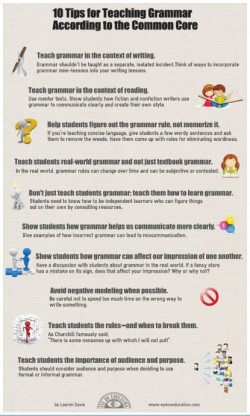 Where do I even begin? I have been doing a lot of thinking about the standards and the amount of grammar that is being “taught/required to be taught” because it seems that grammar has gone by the wayside in favor of other things. The old standards said things like “uses correct conventions of grammar, capitalization, and punctuation.” Well, those things need to be taught before they can be used. And to teach the conventions and correct common mistakes, you need to have the grammar background: the vocabulary, you might say. So just like in math, before you can do complex equations, you need to know how to add, subtract, divide, and multiply. In grammar, you cannot learn about using clauses if you don’t know what a pronoun is, or if you don’t know the difference between a subject and an object… or if you don’t even know what a run-on sentence is.
Where do I even begin? I have been doing a lot of thinking about the standards and the amount of grammar that is being “taught/required to be taught” because it seems that grammar has gone by the wayside in favor of other things. The old standards said things like “uses correct conventions of grammar, capitalization, and punctuation.” Well, those things need to be taught before they can be used. And to teach the conventions and correct common mistakes, you need to have the grammar background: the vocabulary, you might say. So just like in math, before you can do complex equations, you need to know how to add, subtract, divide, and multiply. In grammar, you cannot learn about using clauses if you don’t know what a pronoun is, or if you don’t know the difference between a subject and an object… or if you don’t even know what a run-on sentence is.
So, there is grammar for the sake of writing and speaking correctly, and there is grammar for the sake of itself: knowing your language. Being a grammarian, I think both are important, and knowing the language to a certain extent is important background for speaking and writing correctly.
Well, a few years ago new standards came into play: Common Core. I have a seventh grade grammar book I have used since I started teaching that is apparently aligned with the old standards. It pretty much covered everything, starting with the basics, at a seventh grade level. However, now the standards have changed. And every year, my students seem to come to me with less knowledge of grammar. Some claim they never learned it. I don’t know what they learned during the previous seven years, but knowledge and the grasping of ideas comes with repetition, so if you learn about nouns in first grade, that isn’t enough. These concepts must be reviewed every year and added onto as appropriate with each new grade level.
Common Core. We haven’t had a whole lot of training it it…and we don’t have new materials to teach with. What we hear most often about the new standards for language arts is the trio of (1) writing from evidence, (2) academic discourse, (3) close reading. Sounds fancy…grammar sounds so plain. And nowhere is it included. However, to carry on intelligent academic discourse, or to write anything well at all, with or without evidence, one needs a knowledge of grammar, including capitalization and punctuation. The only standards I could really find when I looked (probably not closely enough) at the 7th grade standards were something like “writes using dependent clauses,” and “uses a comma between two adjectives, where appropriate.” Seemed a little random to me. So I looked closer…and closer.
Grammar standards are listed under Language. There are also English Language Arts standards for Listening, Speaking, Reading, and Writing…just like in the old days. Grammar standards are there after all the other ones, but they are sure there…all the way from K through 12. They still seem a bit random to me in the way they are organized. And they are surprisingly sophisticated for the grade levels. Also surprising is the lack of any grammar on the new standardized tests or any type of materials for Core curriculum…but then, I haven’t seen too many materials.
It seems to me that grammar has always been taken for granted…the student should demonstrate knowledge of all these things, but they do need to be taught — over and over again!
Here are some of the new standards with their grade levels. Some of the standards are repeated year after year:
- Subject-verb and pronoun-antecedent agreement – Grades 3-12- In some cases a very difficult concept. And I have yet to see a 7th grader who even knows what an antecedent is!
- Identifying fragments and run ons – Grades 4-12
- Choosing words and phrases to convey ideas precisely – Grades 4,5,6 (Seems a bit sophisticated to not be covered in later grades)
- Choosing punctuation for effect – Grades 4-12 (Pretty sophisticated. First you need to learn how to use it correctly!)
- Correcting inappropriate shifts in verb tenses – Grades 5-12 (Whoa!)
- Correcting vague pronouns – Grades 6-12
- Punctuation for nonrestrictive and parenthetical elements – Grades 6-12 (Yikes!)
- Using a variety of sentence patterns – Grades 6-10 (Somewhat sophisticated and takes practice)
- Maintaining consistency in style and tone – Grades 6-12 (Whoa!)
- Correctly placing phrases and clauses; correcting misplaced and dangling modifiers – Grades 7-12
- Eliminating redundancy and wordiness – Grades 7-12
- Using correct verb voice and mood – Grades 8-12
- Using parallel structure – Grades 9-12
Easy stuff? No. But I am glad to see that it is all there, right in the standards. (The more basic elements of grammar are obviously in the K through 3 standards.) Despite the fact that many of my students don’t know the difference between a subject and an object, they should know by now. Whatever they learned or didn’t learn before, they will learn it this year. I used to feel as if I shouldn’t be teaching much grammar because the standards didn’t stress it. Well, what I have heard about the main features of common core haven’t stressed it. But when I look in the standards, there it is.
Of course, it is nearly impossible to cover everything that is in the standards in a school year! And teachers tend to concentrate on what they enjoy teaching the most. For me, it is grammar.
Often grammar, I think, is treated like broccoli or spinach: It is hidden in other things so those who have to eat it don’t notice! I believe grammar should be taught separately, not in conjunction with whatever literature is being read. Some schools separate literature and language into different classes; a colleague and I have talked about doing that for years, but we don’t think it will ever fly. I think language is not only necessary to teach for the purposes of writing and speaking, but is also interesting and fun…it is like music theory or math…a puzzle.
I no longer feel guilty loading my students up with grammar. And former students and their parents have been happy. So, let’s get out some paper and start diagramming sentences!
Next Week: Question and Answer Time! Send your grammar and punctuation questions to info@bigwords101.com for next week’s post!


